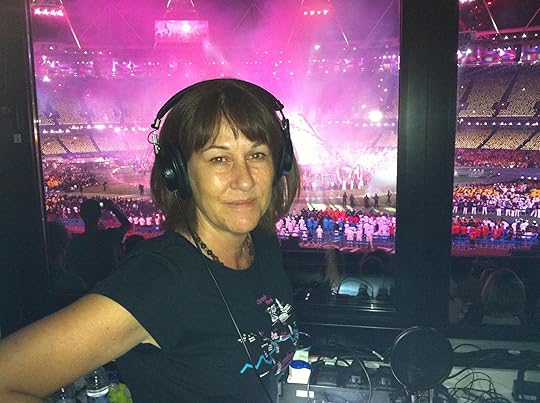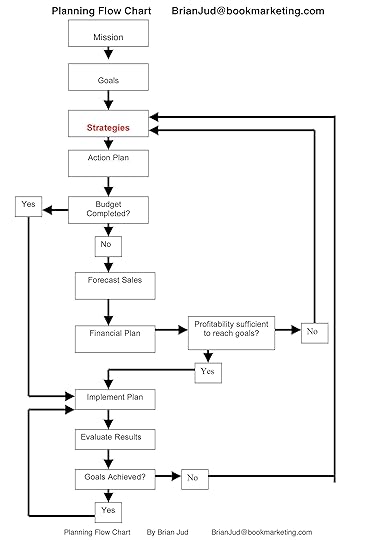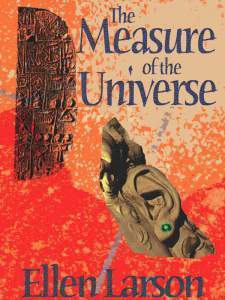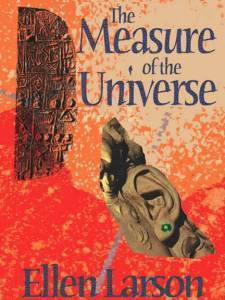Ellen Larson's Blog, page 2
March 29, 2013
How the Stadium Announcer for the Closing Ceremonies of the London Olympics ends up doing the Voiceover for my Book Trailer
Trish Bertram, stadium announcer for the Final Ceremonies of the 2012 London Olympics and for theParalympics, will be doing the small voiceover in the book trailer for IN RETROSPECT, an upcoming science-fiction murder mystery by Ellen Larson (Nov 2013, Five Star/Gale Cengage).

Trish Bertram at the 2012 Olympics
The above is the lead paragraph in the press release I just wrote as part of my ongoing promotion for IR. Needless to say, it was a pleasure to write—and something I never thought I would be writing. In. My. Wildest. Dreams.
How did this happen? Since this blog is about my experiences doing promo for my upcoming book, let’s move along to the second paragraph of the press release for the answer:
The book trailer is being made by artist Michael Sissons, who cold-contacted Ms. Bertram without knowing who she was as part of an extensive online search for just the right voice. Ms. Bertram, an announcer on British TV for over twenty years, promptly agreed to a small fee, stating that she was ‘all for trying to help a bit of entrepreneurialism.’
And that’s the truth.
Being around Mike is like being around a creativity furnace. All this incredibly cool stuff comes streaming off of him, and some of it hits you. For example, if you haven’t checked out the latest version of the book trailer, please do so here. Or just look at this pic from the trailer:
Is getting Trish Bertram a coup? A lucky shot? I don’t know. I’m just here to tell authors, not to go all New Testament on here, that it never hurts to ask.
I’m hoping that having Ms. Bertram aboard will help me get extra attention as I go forward with my promo. We’ll see—and I’ll continue to post updates, of course.
The press release ends with a link to the Kickstarter project I’m currently pushing, which, mind you, is now at 85% filled with 12 days to go (!):
This hook-up is only one example of the new normal for small press authors tasked with doing literally all their own book promotion. As part of their efforts, Larson and Sissons are running a Kickstarter project through April 12 to raise funds for the book trailer and other promotional materials.
That’s it for the press release.
So far, doing early promo for the book, and doing a lot of heavy promo for the book trailer Kickstarter project has been exhilarating. I think I’ve been very lucky to have Mike on board doing his incredible artwork, but I’m gonna look back.
For the curious, here’s a more detailed passage from Ms. Bertram’s Wikipedia page:
“Bertram has been a live TV announcer for over twenty five years, starting her career in 1982 with London Weekend Television. She is the longest serving female television continuity announcer in British television, and is particularly well known for her work with LWT, where she worked on and off for over twenty years – starting as a local cover announcer for Channel 4 transmission before becoming a duty announcer alongside colleagues such as Peter Lewis, Sue Peacock, Ruth Anders and Keith Harrison. Bertram and the rest of the announcing team also read short LWT News Headlines bulletins in-vision during shifts.”
And it goes on, and on, and on….


How I got the London Olympics Stadium Announcer to do the Voiceover for my Book Trailer
Trish Bertram, stadium announcer for the Final Ceremonies of the 2012 London Olympics and for theParalympics, will be doing the small voiceover in the book trailer for IN RETROSPECT, an upcoming science-fiction murder mystery by Ellen Larson (Nov 2013, Five Star/Gale Cengage).

Trish Bertram at the 2012 Olympics
The above is the lead paragraph in the press release I just wrote as part of my ongoing promotion for IR. Needless to say, it was a pleasure to write—and something I never thought I would be writing. In. My. Wildest. Dreams.
How did this happen? Since this blog is about my experiences doing promo for my upcoming book, let’s move along to the second paragraph of the press release for the answer:
The book trailer is being made by artist Michael Sissons, who cold-contacted Ms. Bertram without knowing who she was as part of an extensive online search for just the right voice. Ms. Bertram, an announcer on British TV for over twenty years, promptly agreed to a small fee, stating that she was ‘all for trying to help a bit of entrepreneurialism.’
And that’s the truth.
Being around Mike is like being around a creativity furnace. All this incredibly cool stuff comes streaming off of him, and some of it hits you. For example, if you haven’t checked out the latest version of the book trailer, please do so here. Or just look at this pic from the trailer:
Is getting Trish Bertram a coup? A lucky shot? I don’t know. I’m just here to tell authors, not to go all New Testament on here, that it never hurts to ask.
I’m hoping that having Ms. Bertram aboard will help me get extra attention as I go forward with my promo. We’ll see—and I’ll continue to post updates, of course.
The press release ends with a link to the Kickstarter project I’m currently pushing, which, mind you, is now at 85% filled with 12 days to go (!):
This hook-up is only one example of the new normal for small press authors tasked with doing literally all their own book promotion. As part of their efforts, Larson and Sissons are running a Kickstarter project through April 12 to raise funds for the book trailer and other promotional materials.
That’s it for the press release.
So far, doing early promo for the book, and doing a lot of heavy promo for the book trailer Kickstarter project has been exhilarating. I think I’ve been very lucky to have Mike on board doing his incredible artwork, but I’m gonna look back.
For the curious, here’s a more detailed passage from Ms. Bertram’s Wikipedia page:
“Bertram has been a live TV announcer for over twenty five years, starting her career in 1982 with London Weekend Television. She is the longest serving female television continuity announcer in British television, and is particularly well known for her work with LWT, where she worked on and off for over twenty years – starting as a local cover announcer for Channel 4 transmission before becoming a duty announcer alongside colleagues such as Peter Lewis, Sue Peacock, Ruth Anders and Keith Harrison. Bertram and the rest of the announcing team also read short LWT News Headlines bulletins in-vision during shifts.”
And it goes on, and on, and on….


March 24, 2013
Report: “Create a Marketing Plan to Sell More Books” Create Space Webinar with Brian Jud
I listen so you don’t have to
Before the “But”
I’m a huge fan of Create Space. Though as a cooperative publisher my main squeeze is LSI, as a freelance editor I am happy to recommend CS to writers who want to self-publish quickly. I find the CS website remarkably intuitive and free of extraneous crap. The CS Interior reviewer makes my heart sing, and its cover templates, with the automatic bar-code insertion, are easy to use and well documented. Their phone help is incredible: you call, you get through immediately, the people on the other end of the phone know everything you need to know. Their distribution channels are useful if not all-inclusive (and I expect that all-inclusiveness is right around the corner). And it’s all free, if you want it to be. It all works.
So I was excited to read that CS was hosting a free webinar about marking. I signed up. I marked my calendar. I phoned in at the appropriate time.
But
Unfortunately this webinar was a waste of an hour for me. Admittedly, most of the problem had to do with the expectation I had built up, based on the erroneous title, but then who would sign-up for a webinar titled “Create an Outline for Business Plan that is so Generic You Can Use it for Anything from Ashtrays to  Zucchini”?
Zucchini”?
Mr. Jud, author and marketing strategist, could have been talking about selling coffee mugs or acne cream. His approach in this webinar was that of the entrepreneurial business person, with literally nothing that is specific to writing or publishing. He came across as a business man who chose writing as his business. I view myself as a fiction writer who embraces the challenges of marketing. As such, I found it impossible to identify with what Mr. Jud was saying on any level. Strike one.
Strike two was the lack of marketing specifics. Jr. Jud said he was going to describe a plan. What he did was provide the bullet points for a plan (a generic right that would do for any product, right?), then left it at that. See “What He Actually Said” below.
Poor Mr. Jud, you were undermined by CS and never stood a chance. Or possibly you really do not know the difference between facts and relevant facts. Your webinar was remarkably generic and full of buzz works with zero—and I mean zero—ideas specific to book marketing.
The Fiction v Non-fiction Dynamic
Despite the generic nature of the webinar, Mr. Jud did frequently mention the words book marketing, particularly with reference to his own books, which he markets, all of which appear to be non-fiction. Including the one on how to market books.
I admit to a prejudice. I am sick and beyond tired of being promised information on book marketing only to discover that the information provided is ninety-five percent about non-fiction books. Which are much easier to market than fiction, particularly if you are self-publishing. My prejudice began with the estimable Dan Poynter, whose book was vaunted as _the_ book for self-publishing authors some twelve years ago when POD first made the concept financially viable. I diligently scoured Mr. Poynter’s book and on-line writings, in search of the same information Mr. Jud promises: solid business advice on how to sell books. And I got exactly what I got from Mr. Jud: the occasional bone thrown to those of us in the fiction wilderness in the form of: “this also works for fiction.” Mr. Jud even mentioned Dan Poynter (in a sort of “he got there first” competitive way). But in fact the sorts of things Mr. Jud was talking about (the “sell yourself” approach as outlined below under “What Was Actually Said) really don’t apply to fiction, or to most fiction writers. A fact that the tales of ebook and online-marketing successes have illustrated. Most fiction writers do not aspire to become consultants or public speakers to moderate their own TV shows. They mostly bloody well mostly just want to write fiction, which takes immense amounts of time.
Early on in his presentation, Mr. Jud stated that mystery writers need to define their target audience and figure out ways to reach them. I’m not paraphrasing, that’s as far as it went. You have to take it as read that there were no specifics in this webinar, remember? That was his first mention of fiction. At minute 49 in the 60 minute webinar, during his bullet points how to grow a publishing business, he said the magic words “This also works for fiction” and then spent two minutes lauding an author he is promoting, a doctor who writes mysteries and has successfully used his doctor status to speak publicly about deaths in mysteries.
Now as we know, it is a great thing for a fiction writer to be an expert in something; expertise gives authority and makes the best possible foundation for promotion. I think warmly of noted mystery author, Martina Navratilova. But what about those fiction writers whose expertise is, y’know, writing? What about those of us in the same expertiseless boat? But I digress. At 51 minutes into the webinar, Mr. Jud ended his discussion of applications for fiction writers. Strike three.
Do I Hear a Counterpoint?
“You are being negative,” I hear you say. “That is the problem with you fiction writers; you have no business sense; you are unwilling to do the grinding work of promotion.” Not true. The distinction I am making is one of approach. I am driven to write; writing fiction defines who I am; it is the thing I do best. I don’t choose what I write because it might (accent on the “might”) lead to the most opportunities to consult, or line up the most and best speaking engagements, or getting a TV show. I might do those things because they sold books, but they are not an end unto themselves for me.
Marketing for fiction writers, from what I understand, needs to be approached from exactly the opposite direction; you look inside, at what you create, and figure out the best ways to market it to the audience you decide your work will most appeal to. Yes, you look for opportunities while writing that will help with your later promotion, and yes, if you have the wonderful expertise, you focus on that. Yes, you market like a fiend and as creatively as possible. And above all you manage your time as both a writer and a marketer—a struggle that Mr. Jud does not seem to be aware of.
So What Did He Actually Say?
If you’ve ever taken Business 101, you will have heard everything Mr. Jud talked about before on the first day. Now it happens I’ve never taken Business 101, but I’ve organized conferences at which it was taught, so I’ve heard this stuff a number of times. I will post one small graphic from the webinar (just as proof), and summarize a few others. For example:
Did you know that if you set aside an hour before work in the morning, an hour at lunch, two hours each evening, and ten hours over the weekend, you can have 30 hours to devote to your publishing business and still keep a full-time job? Of course you can’t have kids, or a social life, or, y’know, write, but that doesn’t seem to have occurred to Mr. Jud.
Did you know that 95 percent of all new business fail? But that 95 percent of all successful business are founded by people who have previously failed with a new business. Now you do.
Did you know that you have to have a plan for distribution channels, including retailers and ecommerce?
Did you know that you should try to interest a venture capitalist in your publishing business (I am not kidding!). And do you know what you have to have to do that? If not, here is your answer:
Mission statement
Executive Summary
Company description
Market Analysis
Internet Plan
Financial Plan
Marketing plan — objective, strategies, action
And finally, did you know that you should “have fun with plan”. This apparently to Mr. Jud involves putting cutsy graphics in your flow chart (still not kidding).
I had the great pleasure of listening to the wisdom of mystery author and speaker Christine Kling at a recent conference in Sarasota FL run by the Florida chapter of the MWA. May I say that there was more useful content in once of Ms Kling’s sentences than in the hour I spent with Mr. Jud? She never talked about writing process; she only talked about sales and marketing, but it was clear that she was a writer and was coming from the same place I come from, which made her business approach To be sure, her experiences and creative ideas were wholly fiction oriented, but no doubt they could be applied to non-fiction as well.
Come on, Create Space! You’re better than this. Figure out how many of your users are publishing non-fiction and how many are publishing fiction and plan accordingly. You only embarrass the estimable Mr. Jud by promoting him as something he is not. Take his advise and know your audience.
The webinar and power-point charts are available free from Create Space here.


March 14, 2013
The Book Trailer + Kickstarter Part II
After taking about three weeks to put together a top-notch Kickstarter project video and reading all the how to articles I could get my digital hands on, I went live this week. The first two days have seen over $400 pledged, which is cool and very encouraging.
After the video, the hardest part of putting together the project was wrestling with the Rewards. All accounts highlight the need to make them good–but if you make them too good, you cut too deeply into your possible proceeds. I settled on a hierarchy of rewards that would cost me on average about one-third the amount of money at each given level. Thus, for a $75 pledge, my cost is about $25 (my cost for 6 postcards, 1 poster, and 1 copy of the book plus mailing costs).
I’m offering my freelance editing services as rewards at the higher reward levels. This is something I pondered a long time over. Would people be interested? Would I have time to do the editing I promised? In the end I decided to go for it, thinking that I would make specific appeals for the Kickstarter project to writers, including my own clients, who might be glad to get a price break on an edit.
I set my goal at $3000, which means that, depending on what reward levels people go for, I can clear about $2000. But I must also deduct the five percent that Kickstarter takes plus the 3-4 percent fee that amazon.com charges for handling the money. So in fact I’m looking at clearing about $1700, if successful.
I think my rewards are pretty good, compared to a lot of other projects that offer just thanks or very inexpensive gifts. That should be a plus for me. Now the question is, how to get the word out!


March 12, 2013
The Book Trailer + Kickstarter Part I
Last month I realized the time had come to decide what to do about a book trailer for the upcoming book release. I’ve heard a lot of opinions about the usefulness of book trailers since I started researching author book promo. Here’s a summary:
It’s now an essential element of all book promotion.
It’s pointless at best, embarrassing at worst.
It was the best thing since sliced bread when the idea first surfaced, now it’s passé.
I admit, old-timer that I am, to having been somewhat repulsed when I first heard of the notion of the book trailer (as I was somewhat repulsed when the term “pitch” first transferred from movies to books). But I’ve adjusted to both. Though it’s clear that if one wants to do a book trailer, it had better be a damned good book trailer.
Talking to a variety of publicists, I learned that many now offer to get your book trailer done for you. Dozens of companies (Google it) have sprung up offering to do the job for you, and just as many sites let you know how to do it yourself (Google it).
I knew I did not have the time, skill, or inclination to do my own book trailer. So I was scouting around the various companies (prices appear to be $200 and up) when, as reported in earlier posts, my artist friend Mike Sissons appeared out of the blue. He agreed to do a trailer soon after.
Even as I had been researching book trailers, I had been researching Kickstarter to see if it would be possible to raise funds for book promotion. That looked like a non-starter, but I quickly realized that I could try to use Kickstarter to fund the book trailer, which is indeed an artistic project with a tangible output.
Check out the Kickstarter Video for the In Retrospect Trailer, which includes a rough demo of the actual trailer:
Click here to go to the Kickstarter Project.
Part II will cover the decisions I made about the rewards and other aspects of the Kickstarter project.


The Book Trailer + Kickstarter
Last month I realized the time had come to decide what to do about a book trailer for the upcoming book release. I’ve heard a lot of opinions about the usefulness of book trailers since I started researching author book promo. Here’s a summary:
It’s now an essential element of all book promotion.
It’s pointless at best, embarrassing at worst.
It was the best thing since sliced bread when the idea first surfaced, now it’s passé.
I admit, old-timer that I am, to having been somewhat repulsed when I first heard of the notion of the book trailer (as I was somewhat repulsed when the term “pitch” first transferred from movies to books). But I’ve adjusted to both. Though it’s clear that if one wants to do a book trailer, it had better be a damned good book trailer.
Talking to a variety of publicists, I learned that many now offer to get your book trailer done for you. Dozens of companies (Google it) have sprung up offering to do the job for you, and just as many sites let you know how to do it yourself (Google it).
I knew I did not have the time, skill, or inclination to do my own book trailer. So I was scouting around the various companies (prices appear to be $200 and up) when, as reported in earlier posts, my artist friend Mike Sissons appeared out of the blue. He agreed to do a trailer soon after.
Even as I had been researching book trailers, I had been researching Kickstarter to see if it would be possible to raise funds for book promotion. That looked like a non-starter, but I quickly realized that I could try to use Kickstarter to fund the book trailer, which is indeed an artistic project with a tangible output.
Check out the Kickstarter Video for the In Retrospect Trailer, which includes a rough demo of the actual trailer:
Click here to go to the Kickstarter Project.
Part II will cover the decisions I made about the rewards and other aspects of the Kickstarter project.


February 18, 2013
E-Publicity: Notes on my E-Séance with Grace Wright (Part 1 Twitter)
A large part of my campaign to achieve the best publicity possible for IN RETROSPECT has been exploring Twitter and facebook. Like most of you, I’ve had facebook and Twitter accounts for a while, but I’ve never gotten the results you often hear about. I decided I was ready to spend some bucks to be educated.
As it happens, while scoping out publicists in general, I spoke with Julie Schoerke at JKSCommunication. As well as giving me a few goods tips. Julie pointed me to Grace Wright, who is the social media guru at JKS. The cost for an hour with Grace was forty bucks. My price range. Here is some of the Wisdom of Grace (with her permission).
Twitter
I learned from Grace that the goal for my use of social media is to get people to know about IN RETROSPECT and share what they know about the book with their followers. That’s different from the goal of “lots of followers,” which is what I’d thought it was about.
Grace explained that one of my intermediate goals is to identify people who have similar interests to me and who are interested in books like mine. This means seeking out other authors with similar books (and whose readers follow them on Twitter). She recommended that I send such authors a direct message after following them and say that we’ve written similar books and might be able to cross promote.
Because IN RETROSPECT is plotted as a mystery but has an undeniable science fiction setting, this means I can turn what I’d previously thought of as a problem (how to promote a cross-genre book) into an asset, because I have double the potential allies.
Short aside: Five Star, my publisher, is bringing IN RETROSPECT out initially in hard cover, with the focus primarily on library sales. A lot of my future success will depend on those library sales. When I spoke with Julie, she recommended that I identify and follow all the librarians I possibly could, and identify those who championed science fiction and those who went in for mysteries. I’m using Listorious to do this.
Grace next suggested that I seek out already existing fan groups for TV shows and movies that were similar to my book. A quick look at my webpage for the book, especially Mike’s illustrations, made her think of Firefly and its mix of post-apocalyptic universe and adventure. Clairvoyant that she is, she asked if I was familiar with Firefly, which, needless to say, I am. She suggested that I work up a list of hashtag topics, such as #firefly, and use them in appropriate tweets to attract fans of such existing groups.
We also talked about the annoying question of what exactly I should be tweeting. One of my main complaints about what I read on social media is the extremely thin content. And I’m not a fan of writers who talk about how they write. Grace recommended that I stick with retweets of cool stuff, updates on my book and the books of others, and updates on the incredible artwork Mike is creating for the book. When I get closer to the release date, she recommended that I run contests and quizzes with free giveaways as prizes and announce them on Twitter.
Twitter tools that work to achieve the goal:
Retweet things you find cool, things about the publishing world and other authors.
To maximize the power of the retweet, use RT @ rather than the retweet button. This way the retweet shows up on twitter page of the person you are retweeting and is seen by their followers.
Create public lists, such as “my favorite authors” to attract readers who like those authors too. I’m thinking Ursula K. LeGuin, Asimov (Robot novel mysteries!), and Rex Stout for starters….
Use Follow Fridays – #FF – as a way to appreciate people following and retweeting you. Yes, it’s only used on Fridays. (I asked so that you wouldn’t have to.)
Grace’s bottom line for all social media was that it’s about give and take; promoting each other. The trap is thinking that a high number of follows leads to automatically success.


February 11, 2013
Podcast: Excerpt of Measure of the Universe
I am featured on this month’s BroadPod (The voices of women in science-fiction, fantasy, and horror, and all the realms in between) reading an excerpt from my SF idyll, The Measure of the Universe. This is the scene with Titek, the alien archeologist, comes to the home of Aisha, the crotchety paleographer. I’m the second of two readers in this month’s Podcast, starting at about 8’20″ (but listen to K.A. too!).
http://broadpod.posterous.com/february-2013-when-separate-worlds-touch


February 6, 2013
SF Book Giveaway
 I’m giving away two free copies of my whimsical sci-fi novel, The Measure of the Universe on Goodreads. This is for the trade paperback version, which includes the infamous Author’s Apology. The draw is open for the month of February. http://bit.ly/VW9Z7d
I’m giving away two free copies of my whimsical sci-fi novel, The Measure of the Universe on Goodreads. This is for the trade paperback version, which includes the infamous Author’s Apology. The draw is open for the month of February. http://bit.ly/VW9Z7d
A wide-eyed archeologist from Aldebaran lands in Greece to study with a sharp-tongued professor of paleography. They discover love among the runes, and a plot spelling disaster for both their worlds.
“Studded with clever double entendres and puns, this makes an engaging read for language lovers” -Booklist
“Bookstore workers will hate trying to figure out where to shelve The Measure of the Universe, which cleverly weaves mystery, romance, and wordplay into a twenty-first century tale.” -Strange Horizons


February 4, 2013
Report: Teleseminar on selling the movie option to your book
Last Thursday I Skyped into Steve Harrison’s free teleseminar on how to sell the movie rights to your book. For the curious, here is a report of what was said. I am unaffiliated with Steve or his colleague Nat Mundel and in no way am endorsing what they say or what they are trying to sell. Indeed, I’m providing this summary so that you don’t have to sign up for it yourself and face the stream of emails that come it its wake (though to be fair, there is a nice unsub link in the emails). Steve and Nat, who can be found at http://www.sellyourbooktohollywood.com are clearly mainly about selling their product to writers, but then so am I, so all cards are on the table.
The first hour of the 90 minute seminar was well organized and informative for a newbie to the concept such as myself. The format was a Q&A between the boys, with no questions from listeners. This was a general overview of how to sell a movie option, with a lot of specifics about how it works and no names provided. At the very least, it was useful to learn a bit of the lingo. The last 30 minutes included a couple of badly recorded interviews that I didn’t much listen before going back to the issue at hand. So, with no further ado:
Intro
Nat’s position is that even though fewer and fewer Hollywood movies are being made, there is in fact increasing demand for story ideas from growing niche distribution markets, including webmovies, webtv, theater on demand, TV movies, movies, and TV. The industry looking for great ideas. Your book does not have to be shaped like what the movie might eventually be.
He recommends that writers avoid going through an agent for movie rights (pointing out that the movie industry is completely different from the publishing industry) and go straight to independent producers with their books. [Nat said that you can find these creatures on-line, but doesn't give any further advice as to how.] Most of the rest of the seminar involved how to make it easy for an indy producer to like your book.
Theater on demand is made possible by new technologies that allow movies to be distributed via satellite or hard drive. Digital production reduces costs, which allows selective audiences to be reached. Niche audiences are sought after rather than ignored. Micro-budget movies are becoming the norm. They are intentionally built to not cater to broad audience.
The Six Steps to Success
1 Make the book “movie-genic.” Your guess is as good as mine as to what that means, but it’s a nice term to know. Titles are key. Options are purchased just for the titles.
2 Have a vision of what the book is appropriate for. Define your book so that you will be able to narrow your search for indy producers to those who are looking for what you write. For example: Is your book procedural, character-driven, plot-driven, large-scale, small-scale, or event-driven? Does it deal with a unique sub-culture? Target you audience. If you have a dominant central character and fewer secondary characters, you’re looking at a movie-like plot. Movies are plot driven. Resolution is also good for movies. For TV, which is more character-driven, you need more characters. TV can be more episodic; resolution not necessarily as key.
3 Determine the right market and identify potential buyers in your market for adaptation. The TV system is totally different from Movie system. Learn the market before approaching. You have to know how deals are structured so you can design your deal from the beginning to make it easy. Understand who writes, who gets a cut, what your options are, etc. Don’t fight the system. Don’t insist on being the writer if that’s not how the system works.
4 Create pitch materials directed at buyers. Meaning producers. Pitch TV and film differently. Buyers have to understand your concept. Create a logline: In telling language/industry language, describe what the story is about. Don’t talk about themes and generalities. These don’t resonate with Hollywood buyer. Refer to specific struggle and the setting. Nat has created a logline formula (another good vocab addition) that he lives by:
Nat’s logline formula: NAME OF SCREEN STORY is a GENRE about NAME OF PROTAGONIST, AGE, ONE OR TWO VIVID WORDS DESCRIBING THE CHARACTER who wants HIS/HER IMMEDIATE GOAL. When THE INCITING INCIDENT happens and ONE MAJOR PLOT POINT, he/she goes on a journey to ACCOMPLISH GOAL and discover/realize/find THEME. You don’t have to use every element; pick and choose
what fits your book.
Create a one or two paragraph version of the logline as a short synopsis. Create a two or three page version of story for a long synopsis.
Write a treatment. The screen adaptation version. The interpretation of the book for the screen. Presentation treatment? [Nat was vague on how long a treatment he was talking about. Having a treatment makes it easy for the producer.
5. Find up-and-coming producer in your market to champion book. Find somebody like-minded. Producer in the industry. They will help you finalize the treatment. Check industry databases, watch movies and read credits.
6. Know how to make a deal. You’re trying to sell an “Option Agreement.” It’s unlikely any producer is going to give you a lot of money up front. The producer is going to believe in your book, spend a year or more running around, creating a management team, writing screenplays. Gives them the right to run the book around town and try to make a deal. Though you won’t get much money up front, rewards are to be had down the road. Keep it a simple option agreement; be easy to work with.
And that’s it! Just as if you sat there for 90 minutes and took notes!








